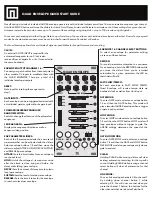
4-24
4.2.2.2 Regulating the sensitivity level to match the reception
signal strength
Display of reception
signal strength and
sensitivity
Reception signal strength and sensitivity are shown in the following segments of the
display:
Segment
Mode of operation
1
Reception signal display bargraph
The strength of the reception signal is represented by this bargraph
scale. These are relative values which are based on the sensitivity
level set in the receiver.
The triangles (
▲▼
) above and below the scale are a visual marker
for maximum values. They move towards the right as long as the
signal strength increases and continue in this direction until it either
levels off or decreases. The maximum marker remains in this
position for 3 seconds and thus provides the user with a helpful
visual aid for determining the maximum signal strength.
2
Sensitivity display (gain level in %)
The sensitivity level set in the receiver (which coincides with the total
spectrum which the receiver is capable of processing) is represented
by this scale. The higher the level of sensitivity is set, the more
capable the receiver is of detecting weaker signals.
The numeric display above the bars shows the utilisation factor as a
percent.
Regulating the sensitivity
level
Should the scale for reception signal strength bargraph provide virtually no
indication, or the display is completely utilised, either a manual or automatic
adjustment of the sensitivity level has to be made.
To start an
automatic
sensitivity level adjustment, the button has to be pressed
once. The sensitivity level of the receiver will be automatically adjusted so that the
strength of the signal currently being received will be optimally displayed (fill half of
the scale).
To start a
manual
sensitivity level adjustment, the
button has to be pressed for
about 2 seconds. The following indicator will appear in the display:
Now the sensitivity of the receiver can be decreased by one percent by pressing the
button, or increased by one percent by pressing the button. This process can
be accelerated by holding down the respective button.
To exit the manual sensitivity level adjustment menu, the
button has to be
pressed for two seconds. By pressing the button only short, the depth measurement
process will begin (see section
4.2.5 Determining the depth of a line
2
3
1
2
2
1
2
www.calcert.com
1.800.544.2843
0
5
10
15
20
25
30












































